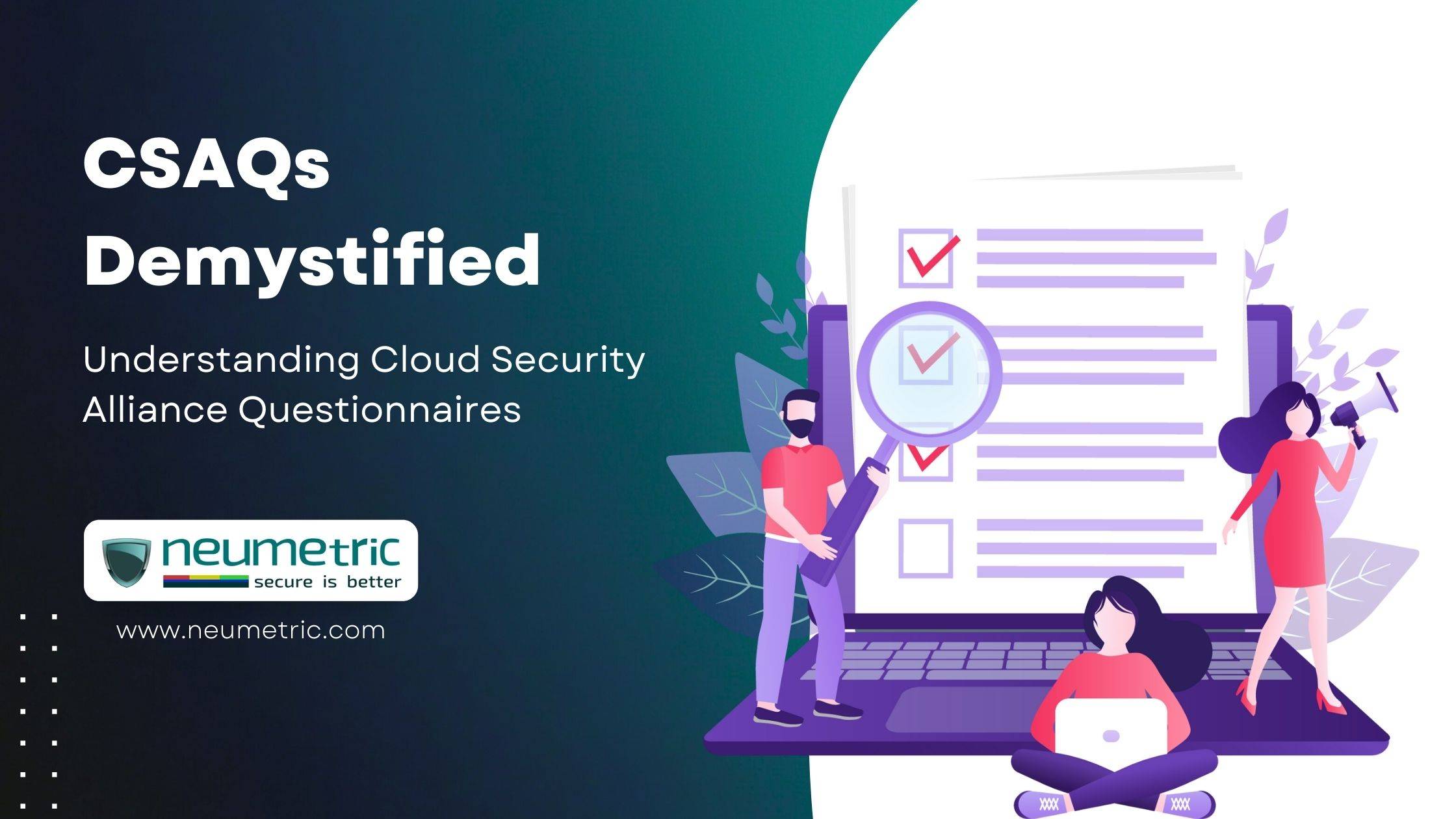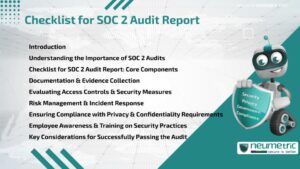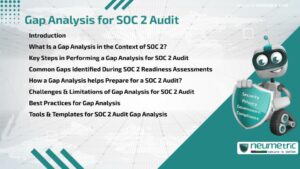Table of Contents
ToggleIntroduction
Cloud computing has revolutionised the way organisations store, process & access data, providing numerous benefits such as scalability, flexibility & cost-efficiency. However, as more businesses migrate their operations to the cloud, ensuring robust security measures becomes a critical priority. This is where the Cloud Security Alliance [CSA] & its questionnaires play a vital role in demystifying & assessing cloud security.
The Cloud Security Alliance [CSA] is a respected non-profit organisation focused on promoting secure cloud computing practices & standards. Among their notable tools is the CSA questionnaire, which serves as a comprehensive assessment framework for evaluating the security capabilities of Cloud Service Providers. These questionnaires provide organisations with a standardised approach to assess & compare Cloud Providers, enabling informed decisions based on their security posture.
In this Journal, we explore CSA questionnaires, clarifying their purpose, components & benefits. Our goal is to help readers understand how these questionnaires assess the security posture of Cloud Service Providers. We discuss their key components, including scope, categories & evaluation criteria. Additionally, we cover various types of CSA questionnaires, such as Consensus Assessments Initiative Questionnaire [CAIQ], Cloud Controls Matrix [CCM], Continuous Audit Readiness [CAR] Questionnaire & Standardised Information Gathering [SIG].
Understanding Cloud Security Alliance [CSA]
The Cloud Security Alliance [CSA] is a non-profit organisation dedicated to promoting the adoption of best practices & standards for secure cloud computing. Founded in 2008, CSA brings together industry experts, Cloud Service Providers & end-users to collaborate on developing & disseminating resources that enhance cloud security.
CSA questionnaires serve as essential tools for organisations to assess the security capabilities of Cloud Service Providers. They provide a standardised framework for evaluating the security controls, policies & practices implemented by Cloud Providers, enabling organisations to make informed decisions regarding their cloud service selection.
CSA has developed various questionnaires to address different aspects of cloud security. Some of the commonly used CSA questionnaires include the Consensus Assessments Initiative Questionnaire [CAIQ], the Cloud Controls Matrix [CCM], the Continuous Audit Readiness [CAR] Questionnaire & the Standardised Information Gathering [SIG]. Each questionnaire focuses on specific areas & provides a structured approach to assess the security posture of Cloud Providers.
Key Components of CSA Questionnaires
Cloud security assessments are undergoing significant advancements to meet the evolving needs of organisations. One prominent trend is the shift towards dynamic & continuous monitoring instead of traditional point-in-time evaluations. This approach allows organisations to assess the security posture of Cloud Providers in real-time, enabling prompt identification & mitigation of emerging risks & vulnerabilities.
Automation & Artificial Intelligence [AI] technologies are playing a crucial role in streamlining the CSA questionnaire assessment process. Automated tools facilitate data collection, analysis & scoring, reducing manual effort & ensuring more accurate & consistent results. AI-powered analytics provide valuable insights by detecting patterns, anomalies & trends in security controls. This helps organisations proactively identify weaknesses & make informed decisions to enhance their cloud security.
Furthermore, automation & AI can enable organisations to conduct more frequent & comprehensive assessments, moving away from periodic audits towards continuous monitoring. This shift allows for timely detection of security issues & faster response to emerging threats, strengthening the overall security posture of cloud environments.
Collaboration & knowledge sharing within the CSA community are key drivers of innovation in cloud security assessments. By exchanging ideas, experiences & best practices, organisations, Cloud Providers & security professionals contribute to the development of standardised guidelines & benchmarks. This collaboration promotes consistency, comparability & the establishment of industry-wide security standards.
Common Types of CSA Questionnaires
- Consensus Assessments Initiative Questionnaire [CAIQ]: The Consensus Assessments Initiative Questionnaire [CAIQ] is a comprehensive questionnaire developed by the CSA. It aims to standardise the assessment of Cloud Provider’s security capabilities. The CAIQ provides a set of questions & control objectives that organisations can use to evaluate the security posture of Cloud Providers.
- Cloud Controls Matrix [CCM]: The Cloud Controls Matrix [CCM] is a framework that aligns cloud security controls with industry-accepted standards & regulations. It offers a detailed mapping of security controls across various compliance frameworks, allowing organisations to assess Cloud Provider’s compliance with specific requirements.
- Continuous Audit Readiness [CAR] Questionnaire: The Continuous Audit Readiness [CAR] Questionnaire focuses on assessing a Cloud Provider’s readiness for audits & regulatory compliance. It helps organisations determine whether a Cloud Provider has the necessary controls & processes in place to facilitate & support audit activities.
- Standardised Information Gathering [SIG]: The Standardised Information Gathering [SIG] is a collaborative tool that streamlines the assessment process by providing a standardised set of questions & criteria. It promotes consistency & efficiency in evaluating the security controls of Cloud Providers.
Benefits of Using CSA Questionnaires
- Standardised approach to assessing cloud security: CSA questionnaires provide a standardised approach to evaluating cloud security, ensuring consistency & comparability across different Cloud Providers. This allows organisations to make objective assessments & gain a better understanding of the security capabilities of potential providers.
- Streamlined vendor evaluation & selection process: By utilising CSA questionnaires, organisations can streamline the vendor evaluation & selection process. The questionnaires provide a structured framework to collect relevant information, enabling organisations to assess multiple Cloud Providers efficiently & effectively.
- Enhancing transparency & understanding of security controls: CSA questionnaires promote transparency by requiring Cloud Providers to provide detailed information about their security controls, policies & practices. This enhances organisation’s understanding of the security measures implemented by Cloud Providers, enabling them to make informed decisions based on accurate & comprehensive information.
- Facilitating compliance with industry standards & regulations: CSA questionnaires are designed to align with industry standards & regulatory requirements. By utilising these questionnaires, organisations can evaluate the extent to which Cloud Providers comply with specific standards & regulations, thereby facilitating compliance efforts.
How to Leverage CSA Questionnaires
- Preparing for the questionnaire assessment: Before conducting a CSA questionnaire assessment, organisations should clearly define their objectives, establish assessment criteria & determine the scope of the assessment. This preparation ensures that the assessment is focused & aligned with the organisation’s specific needs.
- Requesting & reviewing vendor responses: Organisations should request Cloud Providers to complete the CSA questionnaire & carefully review their responses. It is essential to verify the accuracy & completeness of the provided information, seeking clarification or additional details when necessary.
- Analysing & interpreting questionnaire results: Once the questionnaire responses are received, organisations should analyse & interpret the results. This involves evaluating the Cloud Provider’s security controls, identifying any gaps or areas of concern & comparing the assessment outcomes with the organisation’s security requirements & expectations.
- Incorporating questionnaire findings into decision-making processes: The findings from the CSA questionnaire assessment should be considered in the decision-making processes regarding the selection of Cloud Providers or the ongoing management of existing cloud service relationships. The assessment results can help organisations prioritise security requirements, negotiate Service Level Agreements [SLAs] or implement additional compensating controls if needed.
Challenges & Considerations in Using CSA Questionnaires
- Complexity & customization requirements: CSA questionnaires can be complex, requiring a deep understanding of cloud security concepts & practices. Moreover, organisations often need to customise the questionnaires to align with their specific requirements, adding complexity to the assessment process.
- Keeping up with evolving CSA questionnaires: As cloud computing evolves, CSA questionnaires are periodically updated to address emerging security challenges & incorporate new best practices. Organisations need to stay informed about these updates & ensure that their assessment processes align with the latest versions of the questionnaires.
- Ensuring accuracy & reliability of vendor responses: Organisations rely on the accuracy & reliability of vendor responses when assessing cloud security. However, verifying the authenticity of the information provided by Cloud Providers can be challenging. Organisations should consider additional validation mechanisms, such as independent audits or on-site visits, to enhance the trustworthiness of the assessment process.
Tips for Effective Use of CSA Questionnaires
- Customising the questionnaire to align with specific requirements: Organisations should tailor the CSA questionnaires to their specific needs by adding or modifying questions to address their unique security concerns, regulatory requirements or industry-specific standards.
- Collaborating with internal stakeholders & subject matter experts: Engaging internal stakeholders & subject matter experts in the CSA questionnaire assessment process enhances the accuracy & relevance of the assessment. Their expertise & insights contribute to a comprehensive evaluation of Cloud Provider’s security capabilities.
- Engaging in open dialogue with vendors during the assessment: Organisations should foster open communication & collaboration with Cloud Providers during the assessment process. This allows for clarification of questions, discussion of security controls & verification of the information provided, leading to a more accurate & meaningful assessment.
- Regularly reviewing & updating the questionnaire to reflect changing needs: Cloud security requirements & practices evolve over time. Organisations should periodically review & update their CSA questionnaires to reflect changes in their security needs, industry standards & regulatory landscape. This ensures the ongoing relevance & effectiveness of the assessment process.
Future of CSA Questionnaires & Cloud Security Assessments
Cloud security assessments are undergoing significant advancements to meet the evolving needs of organisations. One prominent trend is the shift towards dynamic & continuous monitoring instead of traditional point-in-time evaluations. This approach allows organisations to assess the security posture of Cloud Providers in real-time, enabling prompt identification & mitigation of emerging risks & vulnerabilities.
Automation & Artificial Intelligence [AI] technologies are playing a crucial role in streamlining the CSA questionnaire assessment process. Automated tools facilitate data collection, analysis & scoring, reducing manual effort & ensuring more accurate & consistent results. AI-powered analytics provide valuable insights by detecting patterns, anomalies & trends in security controls. This helps organisations proactively identify weaknesses & make informed decisions to enhance their cloud security.
Collaboration & knowledge sharing within the CSA community are key drivers of innovation in cloud security assessments. By exchanging ideas, experiences & best practices, organisations, Cloud Providers & security professionals contribute to the development of standardised guidelines & benchmarks. This collaboration promotes consistency, comparability & the establishment of industry-wide security standards.
Conclusion
In conclusion, CSA questionnaires serve as valuable assessment tools for evaluating the security capabilities of Cloud Service Providers. Throughout this Journal, we explored the key aspects of CSA questionnaires, including their purpose, components & benefits. By understanding the scope, categories & evaluation criteria of these questionnaires, organisations can make informed decisions when selecting Cloud Providers & enhance their overall cloud security posture.
Understanding & leveraging CSA questionnaires are of utmost importance for ensuring robust cloud security. These questionnaires provide a standardised approach to assess & compare Cloud Providers, promoting transparency, compliance with industry standards & streamlining the vendor evaluation process. By utilising CSA questionnaires, organisations can evaluate the security controls of potential Cloud Providers & make informed decisions based on their security posture, thereby reducing risks & strengthening their cloud security strategies.
In a rapidly evolving cloud landscape, where security threats are ever-present, CSA questionnaires offer a comprehensive framework for organisations to evaluate the security capabilities of Cloud Service Providers. By leveraging these questionnaires effectively, organisations can enhance their cloud security, mitigate risks & establish a strong foundation for a secure & reliable cloud infrastructure.
FAQs
What is the Cloud Security Alliance?
The Cloud Security Alliance [CSA] is a non-profit organisation dedicated to promoting the adoption of best practices & standards for secure cloud computing. It brings together industry experts, Cloud Service Providers & end-users to collaborate on developing & disseminating resources that enhance cloud security.
What is CSA framework?
The CSA framework refers to the set of guidelines, best practices & standards developed by the Cloud Security Alliance [CSA] to ensure the security of cloud computing. The framework provides organisations with a structured approach to assess & enhance the security posture of their cloud environments.
What is the difference between CSA & NIST?
CSA & NIST are both organisations that focus on promoting best practices & standards for information security. While CSA specifically focuses on cloud security, NIST provides broader guidance for information security across various domains, including cloud computing. Both organisations contribute valuable resources & frameworks that organisations can leverage to enhance their security practices.
What is SSO in cloud security?
SSO stands for Single Sign-On, which is a cloud security mechanism that allows users to authenticate themselves once & access multiple cloud applications & services without the need to re-enter their credentials for each individual service. SSO enhances security by reducing the number of credentials users need to remember & manage, while also providing centralised control over user access to cloud resources.





